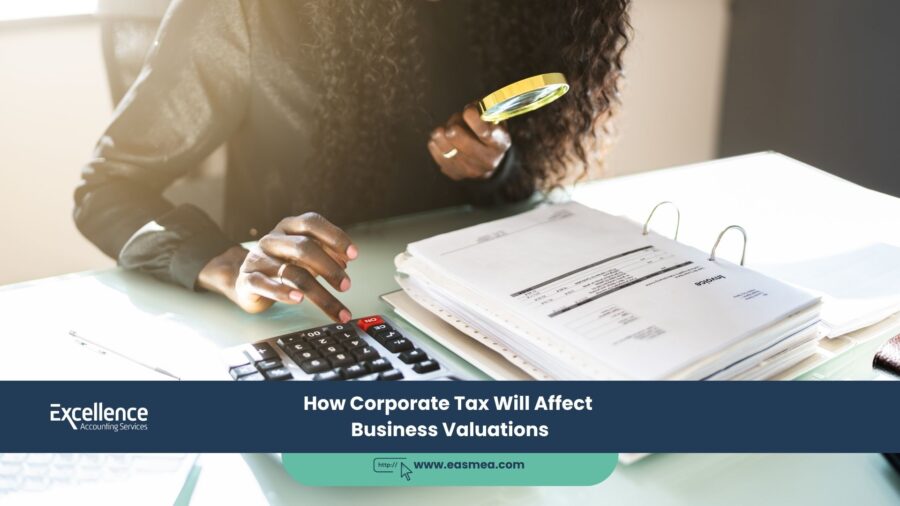How Corporate Tax Will Affect Business Valuations in the UAE
For decades, the UAE’s tax-free environment was a cornerstone of its economic appeal, shaping everything from investment decisions to M&A activity. The process of valuing a business was relatively straightforward, focused purely on pre-tax earnings and cash flows. The introduction of a federal Corporate Tax (CT) regime marks the most significant shift in the UAE’s financial landscape in a generation. It fundamentally rewrites the rules of the game for business valuation, introducing a new layer of complexity and risk that buyers, sellers, and investors can no longer ignore.
- How Corporate Tax Will Affect Business Valuations in the UAE
- Part 1: The New Reality for Valuation Methodologies
- Part 2: The New M&A Landscape - Due Diligence is Paramount
- How Excellence Accounting Services (EAS) Navigates Valuation in the CT Era
- Frequently Asked Questions (FAQs)
- What is Your Business Truly Worth in the New Tax Era?
Valuation is no longer a simple exercise in forecasting future profits; it is now an intricate analysis of post-tax cash flows, deferred tax assets, potential historical liabilities, and strategic tax planning. The 9% tax rate is not just a number to be subtracted; it permeates every component of a company’s financial DNA. This guide provides a comprehensive analysis of how the UAE Corporate Tax will affect business valuations, exploring the impact on standard methodologies, the new dynamics in M&A transactions, and the critical importance of tax due diligence in this new era.
Key Takeaways on Corporate Tax and Valuations
- Cash Flow is King (and is now taxed): Valuation models, especially Discounted Cash Flow (DCF), are directly impacted as future cash flows will be reduced by the 9% tax.
- Tax Shield on Debt: The deductibility of interest expenses creates a “tax shield,” which can slightly lower the weighted average cost of capital (WACC) and positively influence valuation.
- Historical Multiples are Outdated: Pre-tax valuation multiples (like EV/EBITDA) are now less relevant. The market will need to establish new, post-tax benchmarks for comparable company analysis.
- Tax Due Diligence is Non-Negotiable: Buyers will now conduct rigorous tax due diligence to uncover any hidden liabilities, making a company’s compliance history a key factor in its valuation.
- Tax Assets Have Value: A history of tax losses can create a valuable “Deferred Tax Asset” (DTA), which can increase a company’s valuation as it can shield future profits.
Part 1: The New Reality for Valuation Methodologies
Professional valuers use several methods to determine the worth of a business. The introduction of Corporate Tax affects each of these methodologies in distinct and significant ways.
1. The Discounted Cash Flow (DCF) Method
The DCF method is often considered the gold standard in valuation. It estimates a company’s value by projecting its future cash flows and discounting them back to the present day. Corporate Tax hits the DCF model at its very core.
Impact on Free Cash Flow (FCF)
The calculation for Free Cash Flow to the Firm (FCFF) typically starts with Earnings Before Interest and Taxes (EBIT). The new formula looks like this:
FCFF = EBIT x (1 – Tax Rate) + Depreciation & Amortization – Capital Expenditures – Change in Working Capital
Previously, the “Tax Rate” was zero. Now, it’s 9%. This directly reduces the projected cash available to all capital providers, thereby lowering the intrinsic value of the business, all else being equal.
Impact on the Discount Rate (WACC)
The story isn’t entirely negative. The discount rate used in a DCF is the Weighted Average Cost of Capital (WACC). A key component of WACC is the cost of debt, which is now tax-deductible.
WACC = (Cost of Equity x %Equity) + (Cost of Debt x %Debt) x (1 – Tax Rate)
The `(1 – Tax Rate)` factor creates what is known as the “debt tax shield.” Because interest payments are deductible, the effective cost of debt for a company is reduced. This can lead to a slightly lower WACC, which in turn increases the present value of future cash flows. However, for most businesses, the negative impact of taxed cash flows will outweigh the positive impact of the debt tax shield.
2. Comparable Company Analysis (Market Multiples)
This method values a company by comparing it to similar businesses that have recently been sold or are publicly traded. Valuers use multiples like:
- EV/EBITDA (Enterprise Value / Earnings Before Interest, Taxes, Depreciation, and Amortization)
- P/E (Price / Earnings)
The introduction of CT creates a major disconnect. A pre-tax P/E ratio is now meaningless. An EV/EBITDA multiple from a deal that closed in 2022 is not directly comparable to a deal in 2024, because the buyer in 2024 must now factor in a 9% tax on the earnings generated by that EBITDA. The market will take time to adjust and establish new, post-tax benchmark multiples. Early transactions in the CT era will be critical in setting these new standards.
3. Asset-Based Valuation
This method calculates a company’s value by summing up its net assets (Total Assets – Total Liabilities). Corporate Tax introduces new items to the balance sheet that directly affect this calculation:
- Deferred Tax Liabilities (DTLs): These arise from temporary differences between the book value and tax base of an asset. For example, if a company uses accelerated depreciation for tax purposes, it creates a future tax liability. A DTL is a real liability that reduces the company’s net asset value.
- Deferred Tax Assets (DTAs): These are created when a company has tax losses that can be carried forward to offset future profits. A DTA is a valuable asset that increases the company’s net asset value.
A proper business valuation must now include a thorough analysis of these tax-related balance sheet items.
Part 2: The New M&A Landscape – Due Diligence is Paramount
The impact of Corporate Tax is most acute in the context of mergers and acquisitions (M&A). The dynamic between buyer and seller has fundamentally changed.
The Seller’s Perspective: Protecting Value
For those looking to sell their business, the game has changed. Buyers will no longer just look at your revenue and profit; they will put your tax history under a microscope. To protect and maximize valuation, sellers must:
- Ensure Impeccable Compliance: Have a clean history of CT registration, filing, and payment. Any past non-compliance is a red flag that will lead to price reductions for potential penalties.
- Maintain Auditable Records: Your financial statements must be clear, accurate, and prepared according to recognized standards. A robust accounting system is no longer a luxury, it’s a necessity.
- Quantify Tax Attributes: If you have tax losses to carry forward (a DTA), this needs to be properly calculated and presented as a value-enhancing asset.
This is where disciplined accounting and bookkeeping becomes a direct driver of business value.
Maintaining pristine, transparent, and compliant financial records is the single most important action a business owner can take to prepare for a future sale in the CT era. A cloud accounting platform like Zoho Books creates a single source of truth, ensuring that all financial data is organized, accessible, and ready for the intense scrutiny of a buyer’s due diligence team.
The Buyer’s Perspective: Uncovering Risk
For buyers, tax due diligence has escalated from a minor checklist item to a major workstream. A buyer’s team will now focus on:
- Historical Compliance Review: Verifying that the target company has correctly filed all returns and paid all taxes since the law’s inception.
- Identifying Contingent Liabilities: Searching for aggressive or incorrect tax positions taken by the seller that could lead to future penalties from the FTA.
- Validating Deferred Tax Balances: Scrutinizing the calculation of any DTLs or DTAs on the balance sheet to ensure they are accurate.
Any risks identified will translate into purchase price adjustments or demands for specific indemnities from the seller.
How Excellence Accounting Services (EAS) Navigates Valuation in the CT Era
Valuing a business in the post-tax UAE requires a sophisticated blend of financial acumen and deep tax expertise. At EAS, we provide a holistic approach to ensure our clients understand the true value of their business.
- Professional Business Valuation: Our experts conduct comprehensive business valuations using methodologies that are fully adjusted for the impact of Corporate Tax.
- Buy-Side and Sell-Side Due Diligence: We perform rigorous tax due diligence for both buyers and sellers, identifying risks and opportunities that affect the final price.
- Strategic CFO Services: Our CFO services help businesses prepare for a sale by ensuring their financial reporting and tax compliance are impeccable, thereby maximizing valuation.
- M&A Tax Structuring: We advise on the most tax-efficient ways to structure a transaction, helping clients leverage reliefs like the Participation Exemption for share sales.
Frequently Asked Questions (FAQs)
Not necessarily. While the tax on cash flows is a negative factor, other elements like the debt tax shield, the potential value of tax losses, and market-driven changes in valuation multiples make the final impact more complex. However, for a profitable company with no debt, the primary impact will be a reduction in value.
A DTL is treated as a debt-like item. In an enterprise value to equity value bridge, the DTL would be subtracted from the enterprise value (along with debt) to arrive at the equity value. It directly reduces the amount of money the shareholders would receive.
No. Only tax losses that are incurred after a business becomes subject to Corporate Tax can be carried forward to create a Deferred Tax Asset (DTA) and offset future taxable income. Historical losses from the pre-tax era have no value for CT purposes.
It can have a significant positive impact. A QFZP pays 0% CT on its “Qualifying Income.” This means its projected cash flows from these activities are not reduced by tax, leading to a much higher valuation compared to a mainland company with the same level of profitability.
The Participation Exemption is key here. The value of such a company would be greatly enhanced because it can potentially sell its shares in qualifying subsidiaries without incurring any Corporate Tax on the capital gains. A valuer would factor this significant tax shield into the company’s valuation.
EBITDA remains a useful metric for comparing the core operational profitability of companies before the effects of capital structure and tax. However, valuers and investors will now place a much stronger emphasis on metrics that are post-tax, such as EBIT(1-T), Net Income, and Free Cash Flow.
Ensure your tax compliance and financial records are perfect. Work with a professional firm to conduct a “health check” on your tax position and clean up any issues *before* you go to market. A clean, well-documented history is your strongest negotiating tool.
The biggest risk is inheriting undisclosed historical tax liabilities from the seller. If the seller was non-compliant, the FTA can pursue the company for back-taxes and penalties even after you have acquired it. This makes rigorous tax due diligence absolutely essential.
Yes. The starting point for calculating taxable income is the accounting net profit as per the financial statements. The International Financial Reporting Standards (IFRS) dictate how and when revenue and expenses are recognized. A consistent application of IFRS is crucial for creating reliable financial data, which is the foundation of any credible valuation.
It’s theoretically possible in very specific, high-leverage scenarios. If the value created by the debt tax shield (which lowers the WACC) is greater than the value lost from the taxation of operating cash flows, the valuation could technically increase. However, this is an edge case and not typical for the average business.
Conclusion: A New Era for Corporate Value
The introduction of Corporate Tax is more than a compliance exercise; it is a structural change to the financial valuation of every business in the UAE. The simple models of the past are no longer sufficient. A modern, robust valuation must now integrate a sophisticated understanding of tax law, from its direct impact on cash flows to the subtle value of deferred tax assets and strategic exemptions. For business owners, investors, and M&A professionals, adapting to this new reality is not optional. Proactive tax management and expert, tax-adjusted valuation have become the critical tools for preserving and creating value in the UAE’s dynamic new economic landscape.




